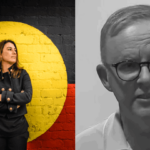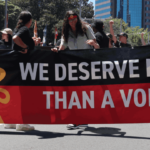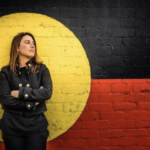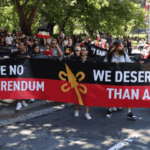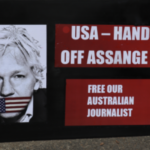Bigoted White Man’s Opinion Reigns Supreme, as Black Sovereigns Silenced on Voice
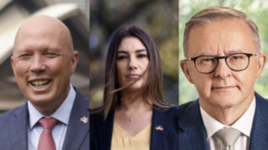
For weeks the voice of federal Liberal leader Peter Dutton has drowned out all others in relation to the coming referendum, which will put to the nation, whether a constitutionally-enshrined Indigenous voice to parliament should be established.
During a 5 April presser, Dutton explained that his party wouldn’t be voting yes to the referendum, as, while it does support First Nations recognition in the Constitution – which was initially the 2007 suggestion of his predecessor John Howard – it doesn’t believe in the effectiveness of the Voice.
This concern over lack of efficacy is shared by the Blak Sovereign movement, which consists of First Nations people who’ve long been calling for the restoration of self-determination, so their communities can, rightfully, control their own affairs.
And unlike Dutton, those First Nations individuals opposed to the Voice do present an alternative, which is treaty.
Although Howard warned against treaty-making, as, in contrast to constitutional recognition, treaties would uphold Aboriginal sovereignty and recognise their rights to land and waters.
But the current Liberal leader’s voice of opposition, buoyed up and circulated by the media, also serves to drown out First Nations resistance to the Voice, thus leaving the mainstream with Dutton as archvillain, Albanese a teary-eyed hero and Indigenous people a mere pawn in their game.
Progressing on the surface
The right of centre Labor government currently in power is obsessed with keeping up appearances, whilst maintaining the status quo. In matters of climate, asylum seekers, war powers reform and cashless welfare, it’s overdelivered on progressive promises and pulled back on any real reforms.
And the Voice does just that. It will be a body of First Nations people charged with advising cabinet on issues that the government deems will affect their communities. Yet, the body won’t be empowered to veto policy, and nor will it be incumbent on ministers to take any notice of its advice.
During a March press conference, which involved discussion of new coal and gas projects, a reporter asked Albanese whether the Voice would be able to consult on such matters, to which the PM responded that the query was one of the strangest he’d ever received on the proposal.
“The Voice is about matters that directly affect Aboriginal and Torres Strait Islander people,” said Albanese, seemingly oblivious to the irony of his answer, as his government continues to permit the appropriation of First Nations lands by fossil fuel corporations against the will of Indigenous people.
“They can if they want, they can ask all sorts of things about whether it will, you know, give advice on who should play five-eight for Souths this week, but that is not what it is about,” the PM added, again answering in a manner that displayed the paternalism and subservience latent in the Voice.
The prioritisation of the referendum promotes Labor as reconciliatory-minded, even though the proposed body relies on the goodwill of a parliament predicated on the destruction of First Nations peoples, whilst a successful vote will actually establish bipartisan-sought constitutional recognition.
Drowning out Indigenous voice
The most prominent First Nations individual speaking in opposition to the voice has been Senator Lidia Thorpe. And being an extremely popular politician with progressively minded voters within the broader Australian community, this posed a very real problem for the Albanese government.
Thorpe, a Gunnai Gunditjmara and Djab Wurrung woman, was a prominent figure amongst the First Nations opposition to the Voice proposal that’s contained within the Uluru Statement from the Heart, when it was unveiled during the May 2017 National Constitutional Convention.
As Thorpe told Sydney Criminal Lawyers last May, she considers that this country needs to go through a process of truth-telling prior to anything else, which would serve to establish the grounds for treaty-making between sovereign entities, and any voice proposal could then be considered.
However, rather than Thorpe’s argument being reported in the media as representative of a long tradition of First Nations political thought, that of the Blak Sovereign movement, with its ties to the Aboriginal Tent Embassy, the senator has rather been shunned and demonised.
Since last September, media reporting has been portraying Thorpe as a troublemaking hindrance to Aboriginal advancement in the form of the Voice, despite the fact that she’s from a lineage of prominent Black political leaders, who’ve long been campaigning for more progressive measures.
Two recent events used to present the senator in a negative light saw her acting in the capacity of an activist, with police officers responding to an Indigenous woman in their usual heavy-handed manner, whilst the last incident involved an argument provoked by others outside a licensed venue.
Sovereign voices suppressed
“We also banned significant leaders from the movement because of their cynicism about government and the country changing,” Professor Megan Davis told the National Press Club last year, referring to who was allowed to speak at the meetings that led to the Uluru Statement.
This admission supports those Aboriginal delegates who stormed out of the final May 2017 dialogue meeting, claiming that their voices were being suppressed during the process, as they attempted to promote treaty as the way forward.
The twelve delegates who walked out of the meeting, included Lidia Thorpe, Jenny Munro and Lynda-June Coe, and, as they told the press at the time, they were seeking a way forward that promoted First Nations self-determination and recognised their sovereignty.
Professor Gary Foley has also been a solid figure of opposition to the Voice. He told 7am in January, that rather than the subject of the referendum being a breakthrough proposal, he’s seen numerous such bodies established over the second half of last century, only to then be disbanded.
The Gumbaynggirr academic recalls PM Harold Holt having created the Council for Aboriginal Affairs in 1967, while seven years on, Gough Whitlam launch the National Aboriginal Consultative Committee, which was the most robust in Foley’s recollection.
From there, prime minister Malcolm Fraser set up the National Aboriginal Congress, which was later replaced by 1980s Labor PM Bob Hawke with ATSIC (the Aboriginal and Torres Strait Islander Commission), which was dropped in 2005 by the nation’s ultraconservative leader John Howard.
“There has been a succession of attempts to enable Aboriginal people to have a voice to parliament, but the essential problem remains… lack of recognition of Aboriginal sovereignty and a lack of genuine self-determination in the sense of political and economic independence,” Foley made clear.
“The advantage of these Mickey Mouse pseudo-advisory bodies – advisory only – is they’ll accept your advice until they don’t like that advice and then they’ll get rid of you,” the key figure in the late 1960s/early 1970s Redfern Black Power movement said in conclusion.


